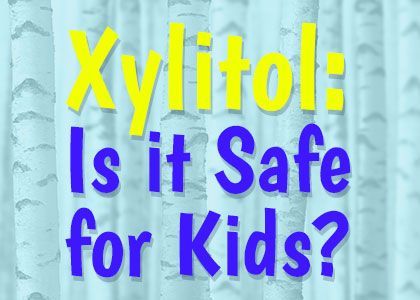Xylitol: Is it Safe for Kids?
Published On: February 13, 2020
 What is Xylitol?
What is Xylitol?
Xylitol is a naturally-occurring substance found in the birch tree and in many fruits and vegetables. Its chemical structure resembles a cross between sugar and alcohol—but it is neither. Xylitol is used as an FDA-approved artificial sweetener that can also assist in the prevention of tooth decay, so Dr. Maxim Godko would like to share some information about xylitol’s safety for children.
How is Xylitol Used?
Because bacteria in the mouth cannot use xylitol as an energy source, oral care products like toothpaste and mouthwash often contain xylitol to help alleviate dry mouth symptoms and prevent tooth deca y. When extracted from birch wood, xylitol can be used as an active ingredient in other medicines as well. Its capability to eliminate or reduce the effects of bad bacteria extends to those that cause ear infections in young children.
How Does Xylitol Work?
Xylitol tastes sweet like sugar but contains fewer calories and is absorbed more slowly by the body, reducing the likelihood of dramatic blood sugar spikes. These characteristics make xylitol an ideal sugar substitute for diabetics. Unlike other artificial sweeteners and sucrose (actual sugar), xylitol reduces the bacteria that cause tooth decay in the saliva.
Is Xylitol Safe for Children?
The unaltered natural xylitol present in fruit and vegetables should be safe for kids, barring allergies or a major produce binge. Cavity prevention medicines containing xylitol used in pediatric dentistry typically range from 7 to 15 grams per day (divided into three to five doses). More than 20 total grams of xylitol per day is not recommended for children.
Like other artificial sweeteners, exceeding the recommended intake of xylitol can cause pronounced physical discomfort, including diarrhea and intestinal gas. Because children’s medicines containing xylitol may taste as good as regular candy, parents need to be careful that kids don’t eat more than the recommended amount!
Non-Medical Products that May Contain Xylitol
If you buy sugar-free items a lot, it’s good to be aware of which items in your kitchen, fridge, or pantry may contain xylitol:
- Packaged goods (ice cream, yogurt, gelatin, pudding)
- Packaged mixes (pudding, gelatin, baking mixes)
- Flavored bottled water
- Powdered drink mixes
- Candies, chewing gum , and mints (keep an eye on your purse!)
- Jams and jellies
- Syrup and honey
- Protein bars and powders
- Peanut and other nut butters
- Vitamins and supplements (especially gummies)
- Liquid shots for energy, sleep, etc.
Keep the Xylitol Away from Your Pets
Xylitol in any amount can be toxic to dogs and cats. If you have reason to believe your pet has swallowed anything containing xylitol—especially if it also contains chocolate—take them to the vet immediately.
Xylitol in the proper doses can be very useful and safe to promote better oral health for both adults and kids. If you have any questions about xylitol, its uses and its safety, contact your Lawrenceville dentist at Deluxe Dentistry today!
The content of this blog is not intended to be a substitute for professional medical advice, diagnosis, or treatment. Always seek the advice of qualified health providers with questions you may have regarding medical conditions.
The post Xylitol: Is it Safe for Kids? appeared first on Deluxe Dental.
Schedule An Appointment
To request an appointment, please call us at (609) 400-1393 or click on the button below to provide your contact information and preferences for the day and time of your appointment.

Dr. Maxim Godko and Deluxe Dentistry post blog articles twice every month covering dental and health-related topics ranging from services and technology to the latest trends in treatments and natural remedies. Feel free to comment, share, and join the conversation!

